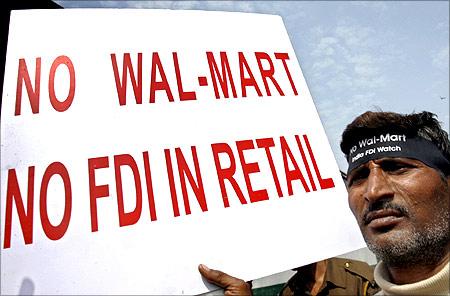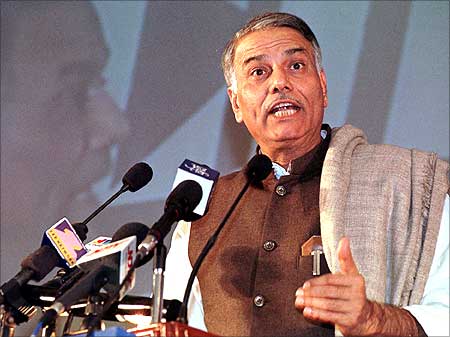
The co-ordination between the government and the leadership of the ruling party has fallen apart, writes A K Bhattacharya.
The United Progressive Alliance is not the first to go back on a Cabinet decision.
The furore over the possibility of a rollback of a Union Cabinet decision on allowing foreign direct investment in retail is understandable.
An executive decision once taken is usually implemented.
If it is not implemented because of political opposition from within the government's alliance partners and outside, it is a danger signal for many reasons.
One, it is a sign of a weak government.
Two, it shows the government has lost the basic skills of political management.
Three, the co-ordination between the government and the leadership of the ruling party has fallen apart.
And finally, it is a clear indication that the country's politicians do not hesitate to play politics with economic reforms and nor do Indian industry leaders seem unduly worried about economic policy stasis.
. . .

Each of these reasons has serious implications for the future of the government.
Whatever be the final decision the government announces in Parliament, when it resumes its winter session on Wednesday, the damage caused by the political debacle is immense and it will be difficult for the Manmohan Singh government to live it down.
Yet, it will be incorrect to claim that this will be the first time that political developments will have forced a government to roll back an executive decision.
Public memory is short.
Remember the rollback in fertiliser price hike decision announced by Manmohan Singh in his first Budget in 1991 as finance minister under the P V Narasimha Rao government!
As finance minister in the Atal Bihari Vajpayee government, Yashwant Sinha, too, had to suffer the trauma of rolling back his decisions announced in his Budgets.
. . .

He had announced the introduction of an exit policy for labour, privatisation of Air India and downsizing of the government's staff strength by as many as 2,000 employees.
More than a decade later, Air India continues to operate as a public sector enterprise, the country is nowhere near a policy that allows retrenchment of surplus workers and there has been no cut in the government's staff strength.
Who torpedoed Manmohan Singh's proposal to raise fertiliser prices in 1991?
A minister in the P V Narasimha Rao government by the name of Balram Jakhar, who at that time was heading the agriculture ministry.
. . .

Who opposed the exit policy for labour in the Vajpayee government?
The labour minister who was not comfortable with that idea. Sinha's proposal for winding up a few government departments like the Films Division was opposed by none else than Sushma Swaraj who was then minister for information and broadcasting.
Air India's privatisation met a similar fate.
The point to be noted here is that executive decisions do get overruled even after the Cabinet approves them and a formal announcement is made.
The Congress is no different from the Bharatiya Janata Party.
You may argue that the announcements made as part of the Budget cannot be strictly compared with a decision taken by Manmohan Singh's Cabinet to allow FDI in retail.
. . .

But remember that all policy announcements made in the Budget get Cabinet approval.
Equally incorrect is the notion that the rollback of executive decision has become more frequent in the era of coalition governments at the Centre.
In 1987, the Cabinet headed by Rajiv Gandhi decided to privatise Scooters India.
That decision never got implemented. More than two decades later, Manmohan Singh's Cabinet again considered the proposal to privatise Scooters India, but that decision too is yet to be implemented.
Those who believe that the likely rollback of the decision on FDI in retail will be the biggest reform move ever to face such a political setback should also review their stance.
. . .

In 2002, the Vajpayee government initiated its biggest reform measure in the oil sector by dismantling the administered price regime for petroleum products.
This, too, was an executive decision and no legislative change was required.
Yet, that decision never got implemented in its entirety.
In the first phase of the decision's dilution, the petroleum ministry began deciding petroleum product prices, instead of the oil marketing companies as was originally envisaged.
And even that pretence was given up when the United Progressive Alliance government took charge in 2004.
. . .

The question of revising petroleum product prices was referred back to the Union Cabinet every time there was a need to revise prices.
Did anybody shed any tears for having rolled back an executive decision taken by the Union Cabinet?
Allowing foreign investment in retail was a big decision.
Rolling it back will be a major political embarrassment for the Manmohan Singh government.
But to say that this is the first time that India's political class has torpedoed economic reforms or is trying to roll back reforms will amount to ignoring what has been happening in this country fairly frequently.
That is the real cause for concern.